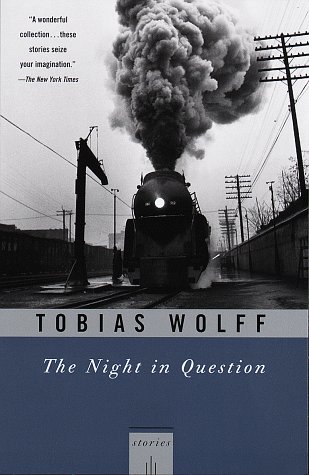Friday, November 27, 2009
In the Garden of the North American Martyrs and The Night in Question by Tobias Wolff
To reaffirm my belief that Tobias Wolff is a great writer, I chose to read two of his short story collections: In the Garden of the North American Martyrs (1981) and The Night in Question (1996). After all, short stories are really what Wolff does best, and his best is exquisite. But while I certainly can't find anything to complain about in Wolff's craft, I still can't say that reading these collections was a pleasant experience. Wolff so expertly gets to the heart of his characters' lonely states and holds them up to the reader like so many unflattering mirrors; it's enough to leave anyone weeping in the dark out of self-pity (not that I did this or anything....ahem).
The twelve stories of In the Garden of the North American Martyrs follow characters who find their places in the world eroding. In the title story, a brown-nosing professor interviews for a job at a prestigious Eastern college, only to learn that she was never really a serious candidate for the position. Another professor, in “An Episode in the Life of Professor Brooke,” realizes that his belief that he could positively affect the lives of others through academia is a myth. “Face to Face” tortuously recounts a decidedly un- romantic weekend vacation for a couple who have grown too far apart.
The Night in Question (1996)'s fifteen stories are similar to those of In the Garden of the North American Martyrs for characters who seek meaning out of life, and find none. The opening tale, “Mortals” is of a man who reports his own death to the local newspaper, hoping to see an outpouring of friends and family. He is sorely disappointed, of course. Other stories follow a book critic who is shot and killed while standing in line at the bank, a young woman who visits her father after his nervous breakdown, and a devoted sister struggling with a brother who obsessively recites a biblical sermon. Wolff doesn't lose his humor, as in "The Other Miller'' a story about a soldier relieved of duty after an erroneous report of his mother's death, who decides to go along with the mistake so he can get out and have a good time. But the overwhelming tone reflects Wolff's lines from "Migraine:" "...Everyone was alone all the time...Even together, people were as solitary as cows in a field all facing off in different directions."
This thought is probably all too true, and Wolff should be commended for articulating it in such a graceful way, with such masterfully-constructed tales. But I read to escape the loneliness of reality, so to find it there so bleak, so heartbreaking, is just too cold and cruel.
Subscribe to:
Post Comments (Atom)




No comments:
Post a Comment